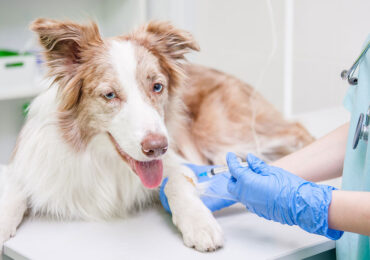As you and your furry friends begin to enjoy the lovely warmer weather, be extremely cautious of the fleas and ticks lurking outdoors that can be dangerous to your pet’s health. At Grand Valley Animal Hospital, we’ve seen a dramatic increase in the amount of tick-borne disease in the northeast North Dakota region.
Last year we diagnosed over 60 cases of Lyme disease and anaplasmosis at our practice alone; this year to date we’ve already diagnosed over 40 cases. Over half of these diagnoses are North Dakota–only dogs, which are typically less at risk compared to those traveling to high-risk areas such as lakes and forests. We are recommending that pet parents take extra precautions to safeguard your pets from these disease-carrying critters, and take advantage of today’s preventative treatment options to help you protect your pet from these irritating and potentially hazardous external parasites.
Read on for more information about these pesky critters, what signs to look for, and most importantly, how to work closely with your veterinarian to formulate the most effective plan for prevention.
Most active in warm, humid weather, fleas are a seasonal problem in our Midwest region. Your pet can pick them up anywhere that an infestation has started, frequently in areas where other cats and dogs are. These sesame seed–sized adult pests are dark in color and can jump rapidly from pet to pet, biting and ingesting the blood of your animal with the potential to transmit several infectious diseases to your pet — or even to people.

The larvae that hatch from female fleas’ eggs fall off your pet and infest their surroundings — beds, furniture, carpet, etc. — and encapsulate themselves in cocoons where they can lie inactive for weeks before emerging as an adult to infest or re-infest pets. For this reason, in addition to treating your pet, it’s extremely important to thoroughly clean areas in your home your pet comes into contact with to reduce the chance of flea population.
Signs of flea infestations to watch for:
- Redness
- Scratching
- Open sores
- Skin infections
- “Flea dirt” (black droppings)
To learn more about fleas, watch this video:
With the potential to transmit serious infectious diseases including Lyme disease, anaplasmosis, plague, and Rocky Mountain Spotted Fever, these dangerous pesky critters are a major threat to your and your pet’s health. Most commonly found in wooded areas, brush, and shrubs, and on any animal or human that enters these areas, ticks seasonally affect our Midwest area. Carefully check over your animal’s skin – and your own – for ticks after being near any of these types of environments.

Ticks are much easier to spot than fleas, as the adult stage of these parasites are typically those that seek a larger host such as a dog or cat. Fast removal of a tick, once spotted on your pet, is extremely important to lessen the chance of disease transmission. Use tweezers to gently, steadily remove the tick, and be careful not to twist or crush the tick to avoid leaving part of the parasite’s mouth in your pet’s skin, which has the potential of infection. Once removed, crush the tick while avoiding contact with any fluid, which could be carrying disease.
For more detailed information on ticks, check out this video:
During flea and tick season, it is essential to your pet’s health to consult with your veterinarian for the best plan of prevention for you and your pet. At Grand Valley Animal Hospital, we strongly recommend 6 months of control (April 1st – Oct. 1st) — or even 7 to 8 months, depending upon the weather.
We carry medications that conveniently offer flea and tick prevention in one. Our preventative options are the best defense against these hazardous parasites, and are guaranteed to be genuine and stored correctly, as well as kept at the lowest cost per dose possible.
For questions or to set up an appointment today, please call our team at 701.757.3500.







